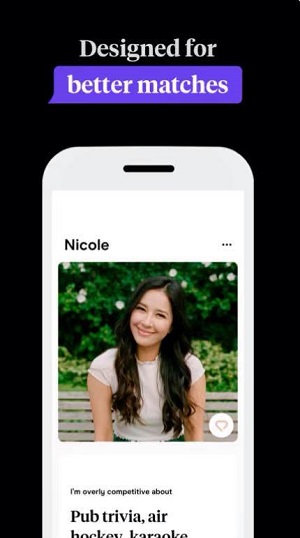How the Hinge Dating Algorithm Works

Hinge has one of the most accurate dating algorithms around. The stats don’t lie: three out of four Hinge matches go on a second date. Moreover, a large percentage of Hinge matches end with marriage or a serious relationship.
How does Hinge do it? How is it possible for one app to make such good predictions? In this article, we’ll explain everything you need to know about the Hinge dating algorithm.
How Does New Hinge Algorithm Work?
You may think that all dating apps use similar algorithms to find potential matches, but that’s not the case. In 2018, the Hinge Algorithm changed. Since then, the number of successful matches has significantly increased.
The first version of the Hinge algorithm was based on connecting you with friends of friends. The app assumed you should have a lot in common with them. However, you no longer need to connect Hinge to your Facebook. You can still do it if you want to, but it’s not necessary.
The new algorithm relies on machine learning. From the moment you sign up to Hinge, the app starts collecting information about you. This may sound scary, but it’s actually a good thing. That way, it can eliminate potential partners that are by no means compatible with you.
First, you have to enter basic information, such as your age, religion, whether you have kids, etc. Of course, you don’t have to answer all the questions if you don’t want to. However, if you have, for instance, strong political views, it’s worth mentioning, so the app doesn’t suggest matches with opposite views.
But that’s just the basics. The real fun starts when you have to answer Hinge’s famous three questions.

The Three Questions
The questions are the base of the Hinge dating algorithm. When you answer them, the app compares your answers to those of other users and tries to find people with similar responses. In short, potential matches.
There are a lot of questions, from philosophical questions to funny, lighthearted, more inconsequential things. You get to choose the three questions you want to answer. If you’re romantic, you may choose to answer a question such as “I’ll know I’ve found the one when…” and describe your ideal relationship.
On the other hand, if you’re laid-back and want to find someone just like you, you’re going to choose a less serious questions. And there are tons of them. Our favorites are: “What’s the most embarrassing song you have on Spotify?” or “What was your worst date ever?” They’re also great conversation starters.
It may seem random, but there’s actually a lot of science behind it. You can find a detailed explanation in the following sections.

Can I Answer More Than Three Questions?
This is one of the most common queries users have. At this moment, it’s not possible to answer more than three questions. Simply, that’s the way that the algorithm works – it can only analyze three questions at one time.
However, if you’re not satisfied with the matches you’re seeing, you can always change your questions. Pick another question and observe how your potential matches change.
Can I Hack Hinge Algorithm?
Although you can’t actually hack Hinge’s algorithm, there are some things you can do to improve your chances of finding the right person.
Our first tip is not to choose questions that are too generic. What does that mean? It’s far easier to answer a generic question, such as “What’s your favorite drink?” than something more complex. However, that doesn’t say a lot about you.
Let’s say you’ve written that you love red wine. That’s fine. But there are so many people out there that love red wine but may not have anything else in common with you. Try to choose more specific questions, those that show more of your personality.
Another tip is to write about the hobbies and activities you enjoy doing. The more unusual they are, the better. That way, you can attract people who share a similar lifestyle. And we believe that’s one of the most critical factors for a good relationship.
On the other hand, you can try to trick the Hinge algorithm by giving answers you think the other person might like. Choose the questions that represent you as a positive, active person. However, there’s no point in writing something just to please someone else, if that’s not really you. If you end up having a date, they’ll soon realize what you’re really like.
Science Behind It
Hinge’s algorithm is inspired by a Nobel-Prize winning algorithm from 1962. The Gale-Shapley algorithm, sometimes called The Stable Marriage algorithm, is based on combinatorics. The two scientists have proven that if you give them an equal number of men and women, they can make perfect combinations for everyone.
It means that this algorithm guarantees that everyone ends up with the person they like the most – and no one is left out. All this wouldn’t be possible without the questions we’ve discussed earlier. The algorithm ranks potential partners by the level of preference. You can’t miss the person you’re most compatible with, because they’re the first person shown to you.
When the algorithm first appeared, it was somewhat difficult to use because you had to handle a lot of information. Today, with the help of machine learning, it can give you accurate predictions in just a couple of seconds.
The App Knows You Better Than You Think
In the end, the most important thing is that the algorithm works and that the users are satisfied with the results. We believe Hinge managed to do that because it’s not uncommon to hear: “This app knows what I want better than I do!” Take advantage of machine learning and let Hinge pick potential dates for you.
Have you already tried Hinge? Have you met anyone interesting? Let us know in the comments section below.













